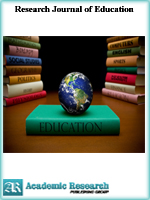Research Journal of Education
Online ISSN: 2413-0540
Print ISSN: 2413-8886
Print ISSN: 2413-8886
Quarterly Published (4 Issues Per Year)

Archives
Volume 4 Number 10 October 2018
Motivational Factors Affecting Lecturers’ Performance at Selected Universities of Economic and Administration in Hanoi, Vietnam
Authors: Tran Thi Thu Nhung
Pages: 161-165
DOI: doi.org/10.32861/rje.410.161.165
Abstract
One of the most important factors that positively influence the performance of lecturers is the motivation toward work, which determines the self-discipline to improve the professional skills, morale, work attitude, and the performance of lecturers. This paper was conducted with the main purpose is to find out job motivational factors affecting on performance of lecturers with the application of reliable model in the situation of economic and administration in Hanoi, Vietnam. By surveying 490 lecturers at universities in Hanoi, the research has shown the relationship of seven motivational factors to lecturers’ performance, of which the greatest impact is “assessment”, followed by “incentives”, “recognition”, “colleagues”, “superiors”, “working conditions”, and finally “works itself”. Finally, based on the results, the research has proposed suggestions to help policymakers develop programs and action targets that enhance the motivation and performance of the teaching staffs in universities; step by step improving the quality of higher education according to the goals that Vietnamese Party and State have set for the higher education sector these days.
School Social Capital and Pupils’ Preparedness for Upper Primary in Nakuru County, Kenya
Authors: V. Wangare Musheru ; J. Kanjogu Kiumi ; I. King’ori Wanjohi
Pages: 155-160
DOI: doi.org/10.32861/rje.15.2018.410.155.160
Abstract
Primary education in Kenya is divided into two levels: lower and upper primary. Successful transition of pupils to upper primary in an education system is dependent on pupils’ masterly of lower primary curriculum. Lower primary curriculum masterly gaps, therefore implies that pupils may encounter challenges in upper primary which may translate to low quality achievement of pupils in upper primary. This appears to be the case in Kenya in general and Nakuru County in particular if pupils’ performance in the Kenya Certificate of Primary Education (KCPE) exit examination is anything to go by. Although level of pupils’ preparedness is dependent on many factors, the study zeroed in on school social capital for it was construed as a critical correlate for quality learning in lower primary. Using an ex-post facto research design, data were collected from 254 class three teachers in Nakuru County through a personally delivered questionnaire and subsequently analysed using simple regression statistic at 0.05 alpha level. The analysis revealed a linear but insignificant relationship (F= 3.491; df= 253; P>.05) between school social capital and level of pupils’ preparedness for upper primary in the study locale. The study further showed that the beta value (β= -0.019) was negative and statistically insignificant (t= -0.310; P> 0.05). This finding implied that the selected aspects of social capital had a negative effect on pupils’ preparedness for upper primary although the impact was not statistically significant. The adjusted R2 value (R2= 0.0031) further indicated that the focused facets of school social capital only accounted for 0.31% of variation in pupils’ preparedness for upper primary. The study offers useful insights on how schools can build social capital with a view to enhancing their capacity to effectively prepare pupils’ for upper primary and thereby raise their chances of excelling in the KCPE examination.



